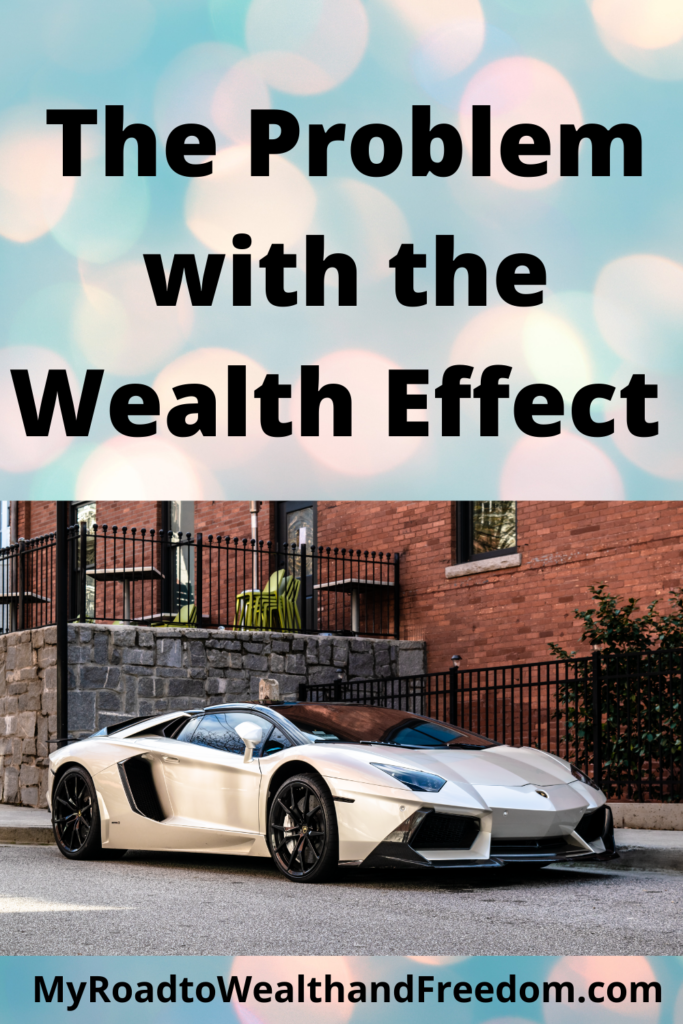
What is the Problem with the Wealth Effect? Anyone reading financial media may have encountered the term “wealth effect.” In this post I examine this term – what it means, why central banks are fostering it and why it’s very dangerous for aspiring millionaires and the FIRE crowd to fall victim to it.
What is the Wealth Effect?
Investopedia defines the Wealth Effect as:
a behavioural economic theory suggesting that people spend more as the value of their assets rise. The idea is that consumers feel more financially secure and confident about their wealth when their homes or investment portfolios increase in value. They are made to feel richer, even if their income and fixed costs are the same as before.
How many times have we seen people behave in that manner. They’re feeling rich because their home has increased in value so they borrow money to put in a swimming pool or go on a vacation or buy a new car. Just prior to the US housing bust in ’07 we saw exactly that kind of consumer behaviour.
Central Bank Policies and the Wealth Effect
Since the Global Financial Crisis of ’07 to ’09, a primary objective of the central bank policies of zero percent interest rates (ZIRP) and quantitative easing (QE) have been to goose asset prices and spur consumer spending through the wealth effect.
We need to ask ourselves where would these asset prices be in the absence of the massive stimulus support provided by central banks?
Don’t Get Fooled by Net Worth
The wealth effect is essentially an illusion that masks real risks to our financial well being. I’ve been struggling with this wealth effect phenomenon for a few years.
Back in 2017 our net worth crossed the $1 million mark for the first time. We had become a millionaire household. But we didn’t feel like millionaires because we had $700k of debt!
Tracking net worth is a great way to measure financial progress, but I think the most important piece of information contained in that measure is the amount of debt that we have. Simply put, Debt equals Huge Risk. Asset prices rise and fall but debt remains and the monthly payments remain constant; regardless of market conditions and the health of the economy.
Passive Income May Not Save Us
In March 2020 we saw asset prices across the board fall significantly. Those who were relying on passive income from their investments saw governments declare eviction bans and rent moratoriums; while companies slashed their dividends.
Things were so bad that governments had to send out money to everyone because most didn’t have enough to make it to the end of the month!
Passive income is great when it works, but as we saw over the last 18 months, there is no guarantee that it will be there when we need it most.
What Is True Wealth?
This brings me to an important question about the nature of true wealth? Of course things like family, friends, health and community are there. But in terms of personal finance, how do we define true wealth?
When I think of true wealth, I think in terms of solid foundational things that impact our financial lives. These include being debt-free, including a paid-off home. Having some cash savings as well as fully funded retirement and education accounts. I also think people should own some quantity of hard assets outside the banking system.
I think these are the things we should be focusing on in the initial stage of our wealth-building journeys.
Thanks for reading this post on the Problem with the Wealth Effect.
Yes i have a 1867- 1967 25c with a bobcat on back and a few coins of a 25c 1973 with mounties horse ride on back how couldvi know what are they worth
Check my Rare Canadian Quarter Article